
|
![]()
Greatest Films of the 1950s
1950 | 1951 | 1952 | 1953 | 1954 | 1955 | 1956 | 1957 | 1958 | 1959
Title Screen Film Genre(s), Title, Year, (Country), Length, Director, Description 

Anastasia (1956), 105 minutes, D: Anatole Litvak

Aparajito (1956, India) (aka The Unvanquished) (Apu Trilogy 2), 110 minutes, D: Satyajit Ray
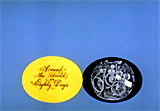

Around the World in 80 Days (1956), 175 minutes, D: Michael Anderson




Baby Doll (1956), 114 minutes, D: Elia Kazan
This Kazan film has been called notorious, salacious, revolting, dirty, steamy, lewd, suggestive, morally repellent and provocative. Time Magazine was noted as stating: "Just possibly the dirtiest American-made motion picture that has ever been legally exhibited..." The stark, controversial, black and white film was so viciously denounced by the Legion of Decency upon its release that many theaters were forced to cancel their showings, but it still did moderately well at the box office despite the uproar. Baby Doll's impact was heightened by its themes: moral decay, lust, sexual repression, seduction, infantile eroticism and the corruption of the human soul. Its advertisements and posters featured a sultry young "Baby Doll" curled up in a crib in a suggestive pose, sucking her thumb. The young actress portraying 'Baby Doll' Meighan, Carroll Baker (25 years old and in her second film) received a well-deserved Best Actress Academy Award nomination for her role. Karl Malden played the role of Baby Doll's sexually-frustrated husband Archie Lee, and Eli Wallach starred as unscrupulous businessman Silva Vaccaro whose main aim was to deflower the child bride. To make the film appear more genuine and authentic, most of it was filmed on location in Benoit, Mississippi. The landmark, tragi-comedy film, one of the most erotic cinematic works ever produced, was based on Tennessee Williams' first original film screenplay, interweaving and adapting two of his earlier one-act plays: "Twenty-Seven Wagons Full of Cotton" and "The Long Stay Cut Short" (aka "The Unsatisfactory Supper"). The highly-acclaimed Williams had many of his plays adapted for the screen in the 1950s: A Streetcar Named Desire (1951), Cat on a Hot Tin Roof (1958), and Suddenly Last Summer (1959)). As before, Williams' work on this film was directed by Elia Kazan, a favorite director of several of his plays on Broadway as well.
Bigger Than Life (1956), 95 minutes, D: Nicholas Ray


Bob le Flambeur (1956, Fr.) (aka Bob the Gambler), 98 minutes, D: Jean-Pierre Melville

The Burmese Harp (1956, Jp.) (aka Biruma No Tategoto), 116 minutes, D: Kon Ichikawa


Bus Stop (1956), 94 minutes, D: Joshua Logan
Aka The Wrong Kind of Girl, this comedy/drama, adapted by George Axelrod (who also co-wrote The Seven Year Itch (1955) also starring Monroe) and based on the hit Broadway play by William Inge, was Marilyn Monroe's first "serious" lead role. She plays Cherie, a fifth-rate, hillbilly saloon-bar singer in Phoenix, originally from the Ozarks, whose dream is to go to Hollywood. Her path crosses that of a naive, callow and rude cowboy from Montana in town for a rodeo, Beauregard 'Bo' Decker (Don Murray in his film debut), who immediately is smitten by his sweet 'angel.' The most memorable moment of Bus Stop is Monroe's famous torch-song performance of "That Old Black Magic" for an unappreciative audience, mixing sensuousness with a wistfully sad, soulful quality. The country bumpkin persistently tries to woo Cherie (whom he crudely calls Cherry) - and forcefully kidnaps her to take her home with him. They become stranded during a blizzard at a roadside bus stop - the Blue Dragon Inn in Idaho, where she eventually falls for her abductor. Widely considered the best role of Monroe's career, it mixed comedy with dark pathos. The film proved Monroe was a more-than-capable actress reflecting her skillful acting talent and some of her own personal insecurities.

Carousel (1956), 128 minutes, D: Henry King


Forbidden Planet (1956), 98 minutes, D: Fred McLeod Wilcox
This influential, classic science-fiction space adventure - the first science-fiction film in color and CinemaScope - and an adaptation of Shakespeare's The Tempest - was a forerunner of the entire Star Trek (and Lost in Space) franchises. The story, set in the 23rd century, told of a journey by astronauts, led by Commander Adams (Leslie Nielsen) on a flying saucer-shaped United Planets space cruiser C-57D to a distant planet-star named Altair-IV with green skies, to investigate the fate of a colony (the Bellerophon expedition) planted about 20 years earlier. Upon their arrival, they met the sole surviving crew member - reclusive philologist Dr. Edward Morbius (Walter Pidgeon) - and his lovely, doe-eyed and very naive 19 year-old daughter Altaira (Anne Francis) who had never seen men. Upon seeing three crew members, she marveled: ("I've always so terribly wanted to meet a young man, and now three of them at once"), and also innocently asked after found swimming nude in a pool: ("What's a bathing suit?"). The film's real star was friendly Robby the Robot (voice by Marvin Miller) (who influenced and was the progenitor of many other future robotic creations), functioning as both a house servant and guard, and providing comic relief: ("Sorry miss, I was giving myself an oil job!"). Dr. Morbius toured "Krell Wonders" with some of the crew members, prefaced by his words: "Prepare your minds for a new scale of physical scientific values, gentlemen." He led them through a huge network of underground rooms, laboratories, deep shafts (composed of "78 hundred levels"), and cranium head-set devices that were reportedly the remains of an advanced technological and sophisticated civilization from 2,000 centuries earlier, inhabited by a mighty race of beings who called themselves the Krells. For some reason, the superior alien race of geniuses had destroyed itself or become extinct. A few of the film's scarier sequences was the night-time scene of the attack on the crew of the flying saucer by a sinister, invisible Id monster - a living, giant biped monster with sloth-like claws, who killed some of the crew at the perimeter of a force field fence. At one point, Commander Adams confronted Morbius and demanded that he explain the Id ("What is the ID?"). At first, Morbius called the Id an outdated and obsolete term, but offered names for the invisible Id monster: ("The beast. The mindless primitive! Even the Krell must have evolved from that beginning"). It slowly became clear that the Krell from 2,000 centuries earlier didn't realize the power that was destroying them from within (their inner subconscious thoughts), and Morbius was reluctant to face the conclusion that he himself was a "living monster." Finally with a startling confession, Morbius admitted that the Id was his own projected or externalized sub-conscious. He explained that he was the source of the monstrous creature, after the Krell had built a machine able to release his inner beast. Morbius was forced to realize that he was unable to control his subconscious desires. In the concluding sequence, Morbius delivered instructions to explosively destroy the 'forbidden planet' of Altair-IV (after triggering the machine's self-destruct mechanism that would detonate in 24 hours) to prevent its terrible technology from ever being used again. As the crew flew off (with Altaira who had been saved), they watched the planet's destruction from afar in space. Academy Award Nominations: 1, Best Special Effects.



Friendly Persuasion (1956), 137 minutes, D: William Wyler
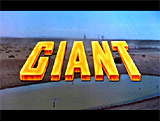


Giant (1956), 197 minutes, D: George Stevens
The sprawling, grandiose and iconic western epic and drama was based on the celebrated Edna Ferber novel about two generations of a wealthy American cattle ranching family spanning a twenty-five year period, who clashed over money, property, class differences, and racism in Texas (the film was shot on location in Marfa, TX). It was particularly poignant as the last (and 2nd posthumous Oscar-nominated) performance of James Dean’s tragically short career. In the film's opening set in the 1920s, newly-wed Maryland socialite belle Leslie Lynnton (Elizabeth Taylor), arrived with her new, wealthy Texas rancher-husband Jordan 'Bick' Benedict, Jr. (Rock Hudson) at his sprawling Benedict Texas ranch (known as "Reata"). They met his older, tough, cattle-driving spinster-sister Luz Benedict (Mercedes McCambridge), who managed the ranch, and uneducated, laconic Texas ranch-hand cowboy Jett Rink (James Dean), in an iconic pose - sitting in the back of a black convertible with his feet up during an outdoor BBQ. In a memorable scene, Rink was instantly made a tycoon millionaire when he struck oil on his own small piece of land (Little Reata). Covered with the gushing liquid black gold (crude oil), he made boastful, defiant and resentful statements to the Benedict family about how he would be richer than them, and made an inappropriate pass toward Leslie (the object of his unrequited love) - this established the origins of a long-standing fierce rivalry. Over the years, Rink aged from a young man to a mumbling outcast and dissolute drunkard (known as "Mr Texas"), especially during the celebratory scene to commemorate the opening of his new airport and hotel in Hermosa, Texas. The lonely and pathetic Rink drunkenly sobbed in the empty banquet room, and rambled about his unrequited love for Leslie. In another memorable scene, Bick engaged in a fist-fight with Sarge (Mickey Simpson), the bigoted cafe owner of Sarge's Place who refused to serve an elderly Latino couple while "The Yellow Rose of Texas" blared on the jukebox. The film received only one Oscar out of its 10 Academy Award nominations (including Best Picture, two Best Actor nominations (for Hudson and Dean), Best Supporting Actress (McCambridge), Best Adapted Screenplay, Best Color Art Direction/Set Decoration, Best Color Costume Design, Best Film Editing, and Best Music Score (Dimitri Tiomkin)) - Stevens won the Best Director Oscar.


High Society (1956), 111 minutes, D: Charles Walters
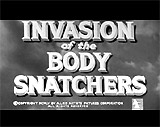


Invasion of the Body Snatchers (1956), 80 minutes, D: Don Siegel
An allegorical, intensely paranoid, chilling science-fiction parable of alien possession, based on Collier's Magazine's serialized story The Body Snatchers by Jack Finney - one of the greatest low-budget 50's films that can be interpreted as philosophical commentary upon the spread of McCarthyism or Communism. Set in the idyllic small town of Santa Mira, California and told in flashback. Physician Dr. Miles Bennell (Kevin McCarthy) begins to become paranoid and suspicious when his patients report that their loved ones, friends, and relatives are not themselves but emotionless shells, replicas, or imposters. Actually, the town is being surreptitiously invaded by strange, alien plant forms called 'pods,' that take over or replicate the likenesses, personalities and identities of human beings while they sleep. Miles and old girlfriend (now recently divorced) Becky Driscoll (Dana Wynter) fight to stay awake and battle the changes that may overtake them. When they flee to escape a similar fate and are chased into an abandoned mine shaft, Becky momentarily falls asleep - and her unresponsive kiss is revelatory. As the last 'human' being, he hysterically screams warnings while running down the middle of a highway, reaching the refuge of a hospital in San Francisco.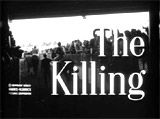



The Killing (1956), 83 minutes, D: Stanley Kubrick
A stylish film noir crime drama, and the definitive heist-caper movie - Kubrick's third film and first successful one, although highly under-rated when released. The tale is about a desperate gang of anti-hero misfits and lowlifes (in an ensemble cast) led by a grim, determined, and recently-released-from-jail con Johnny Clay (Sterling Hayden). The group devises and executes a complex, carefully-timed racetrack heist of $2 million - that goes terribly wrong, similar to Huston's The Asphalt Jungle (1950) (also with Sterling Hayden). The plan is to cause simultaneous, diversionary confusion by shooting one of the racehorses in mid-race and instigating a bar fight, thereby allowing Johnny to rob the main track offices and seize the day's takings. The gang includes racetrack teller George Peatty (Elisha Cook, Jr.), a pathetic wimp and loser who is easily tricked by his devious, scheming femme fatale wife Sherry (Marie Windsor) into revealing the details of the heist to pass to her adulterous lover Val Cannon (Vince Edwards, the future doctor Ben Casey on a TV series), who plans to take the loot at the rendezvous point once the robbery has been accomplished. The entire movie is presented non-chronologically in a winding fashion (with flashforwards and flashbacks), and played out in a series of tense, black-comedy scenes with swift transitions. The doom-laden, voice-over dialogue was derived from Lionel White's novel Clean Break. The film has influenced many heist films, including the original Ocean's Eleven (1960) (also remade in 2001). With excellent cinematography by Lucien Ballard, but ignored completely by the Academy, although this work would influence filmmakers for decades after - most notably Guy Ritchie and crime drama auteur Quentin Tarantino and his film Reservoir Dogs.

The King and I (1956), 133 minutes, D: Walter Lang


A Man Escaped or: The Wind Blows Where It Wishes (1956, Fr.) (aka Un Condamné à Mort S'est échappé ou Le Vent Souffle où il Veut), 99 minutes, D: Robert Bresson

The Man in the Gray Flannel Suit (1956), 153 minutes, D: Nunnally Johnson
Based on the 1955 novel by Sloan Wilson, Gregory Peck portrayed Everyman Tom Rath, who was still haunted by memories of WWII. He faced issues with conforming and reintegrating back into society - in both his career and married life. With homemaker wife Betsy (Jennifer Jones) in the suburbs in the mid-1950s, he struggled to fit into the post-war period as a corporate member of society. However, he told himself: "I never wanted to get into this rat race, but now that I'm in it, I think I'd be an idiot not to play it the way everybody else plays it." In flashbacks to the war years ten years earlier that continually plagued him, Tom recalled how he accidentally killed his good friend Hank with a hand-grenade, and impregnated young Italian Maria Montagne (Marisa Pavan) - a secret he still kept (and was now forced to acknowledge). He never believed he would return home alive from the war. Discontented and suffering from a number of problems, he commuted to NYC from Connecticut to a Manhattan PR job (writing for a mental health campaign) for the New York-based United Broadcasting Corporation. He came to realize that the success of his boss, network president Ralph Hopkins (Fredric March), came at the cost of personal happiness - something that was also happening to him. Tom had a dissatisfied, pushy and overwrought wife, inheritance issues with his suburban house when his grandmother's will was contested, and bratty TV-addicted children. In the conclusion, Tom decided to forgo career advancement in favor of spending more time with his family as a '9 to 5' man.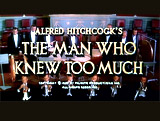

The Man Who Knew Too Much (1956), 120 minutes, D: Alfred Hitchcock

Patterns (1956), 83 minutes, D: Fielder Cook
Originally produced and written as a teleplay about corporate big business by Twilight Zone's Rod Serling (and first airing on The Kraft Television Theatre in 1955), this boardroom-office melodrama featured the sensational tagline: "Ruthless Men And Ambitious Women...Clawing For Control Of A Billion Dollar Empire!!!" The B/W drama about 'gray flannel suits', filmed in a Brooklyn studio and on-location in NYC, was a compelling portrait of industrial giant Ramsey & Co. The corporation was headed by ruthless, menacing, profit-driven business executive Walter Ramsey (Everett Sloane). Other characters were aging, long-time second-in-command aide and exec. VP William "Bill" Briggs (Ed Begley), and young and ambitious industrial engineer Fred Staples (Van Heflin) who was brought in by the demanding Ramsey to replace Briggs as plant manager. Ramsey's devious plan was to bring an exasperated Briggs to the brink of resignation or retirement rather than firing him - in fact, Briggs soon died of a heart-attack from stress, degradation and humiliation. In a showdown with Ramsey, Fred was then challenged to assume the secondary position and also compete for the top job - replacing Ramsey. Fred was enticed with a double salary, stock options, and an unlimited expense account. Fred accepted the VP position, then threatened that he would never give Ramsey any peace as his second-in-command. Supporting characters included Fred's wife Nancy (Beatrice Straight), Fred's reassigned secretary Marge Fleming (Elizabeth Wilson) (who previously worked for Briggs), and Ramsey's cool and efficient secretary Miss Margaret Lanier (Joanna Roos).
The Red Balloon (1956, Fr.) (aka Le Ballon Rouge), 34 minutes, D: Albert Lamorisse


The Searchers (1956), 119 minutes, D: John Ford
A complex, epic, 'psychological' Western story about a man's obsessive five year quest for revenge, set in post-Civil War America. Based on the novel by Alan Le May. This film is unquestionably Ford's finest, beautifully filmed in his most popular locale, Monument Valley. Raiding Comanche Indians, in retaliation, massacre a frontier family and Chief Scar (Henry Brandon) kidnaps the teenaged daughter Debbie (Natalie Wood). The embittered, racist, anti-hero brother Ethan Edwards (John Wayne), a mysterious Civil War Confederate veteran, engages on a journey to pursue his niece - to kill the Chief who abducted her AND to kill his corrupted, tainted, disgraced niece to 'save' her from her savage captors. During their extensive, perilous, grim search, conveyed by a series of flashbacks, he is accompanied by half-breed adopted nephew Martin Pawley (Jeffrey Hunter), who is equally determined to save the girl. This exceptional film was not nominated for Academy Awards.


The Ten Commandments (1956), 219 minutes, D: Cecil B. DeMille
An unequalled epic regularly shown on TV during the Easter season. With great fire and brimstone scenes (with remarkable special effects) regarding Moses (Charlton Heston) who leads a cast of dozens of characters, as he brought the enslaved Israelites out of Egypt, and brought them stone tablets.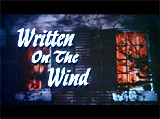

Written on the Wind (1956), 99 minutes, D: Douglas Sirk
A lush, psychosexual, trashy melodrama about wealth, greed and lust, acclaimed director Douglas Sirk's best film, about the decline and self-destructiveness of a rich Texas oil family. Adapted from Robert Wilder's novel. Told in flashback after an opening murder scene, weak Texas millionaire/oil man Kyle Hadley (Robert Stack), the ne'er-do-well son of Texas dynasty magnate Jasper Hadley (Robert Keith), marries beautiful executive secretary Lucy Moore (Lauren Bacall) after an insistent romance. But he becomes suspicious of his best friend Mitch Wayne (Rock Hudson), a handsome, successful geologist, who has similar affections - but only platonic - for Lucy. Kyle's trampy, nymphomaniacal sister Marylee (Dorothy Malone), who wants the unattainable Mitch, fuels Kyle's anxious jealousy, suspicions of his own sterility, and an habitual bout with a bottle by suggesting that Lucy is pregnant with Mitch's child. An unfortunate confrontation ensues, causing Lucy to have a miscarriage. Roaring drunk, gun-wielding Kyle threatens Mitch and ends up dead. An inquest is held to determine Mitch's guilt or innocence, with Marylee's testimony holding his life in the balance.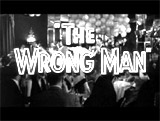



The Wrong Man (1956), 105 minutes, D: Alfred Hitchcock
In this stark, film-noirish, documentary-styled crime drama, Stork Club string bass player and devoted family man Christopher Emanuel "Manny" Balestrero (Henry Fonda), living in the Jackson Heights (Queens) neighborhood of New York City, was mistakenly identified as a suspect for robberies (at gunpoint) at the Associated Life Insurance Company office - and police arrested him. He had visited the office to obtain a loan from wife Rose's (Vera Miles) policy, to pay for her expensive dental work. Detained and held for intense questioning for armed robbery without a lawyer (Manny called the grilling a "meatgrinder"), unusual coincidences caused police to believe that he was responsible for a string of robberies. The innocent 'everyman' Manny protested the charges, claiming he was "the wrong man." After being bailed out for $7,500 after a night in jail, inexperienced criminal attorney Frank D. O'Connor (Anthony Quayle) was hired to defend Manny. His alibi was that he was at a resort hotel with Rose during one of the robberies, but it couldn't be substantiated. Due to the stress of the case, Rose fell into depression, became totally apathetic, and was institutionalized in a mental hospital. During the trial, Manny was convincingly prosecuted, although it was judged a mistrial due to a juror's remarks. Meanwhile, the real robber was caught - his face closely resembled Manny's. The case was dismissed. In the film's epilogue, Rose was eventually cured two years later, and the couple moved to Florida.